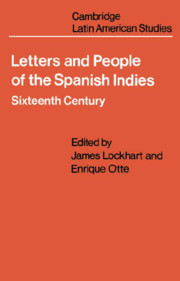Book contents
- Frontmatter
- Contents
- Preface
- Part I Conquest
- 1 Conquest in the personal view
- 2 A standard conqueror's report
- 3 The woman as conqueror
- 4 The merchant and the conquest of Peru
- 5 The merchant and the conquest of Mexico
- 6 The non-hero
- 7 The successful conqueror
- 8 The unsuccessful conqueror
- 9 The conqueror-governor
- 10 The conqueror in jail
- Part II The Variety of Life in the Indies
- Part III officials and Clerics
- Bibliography
- Index
6 - The non-hero
from Part I - Conquest
Published online by Cambridge University Press: 06 August 2018
- Frontmatter
- Contents
- Preface
- Part I Conquest
- 1 Conquest in the personal view
- 2 A standard conqueror's report
- 3 The woman as conqueror
- 4 The merchant and the conquest of Peru
- 5 The merchant and the conquest of Mexico
- 6 The non-hero
- 7 The successful conqueror
- 8 The unsuccessful conqueror
- 9 The conqueror-governor
- 10 The conqueror in jail
- Part II The Variety of Life in the Indies
- Part III officials and Clerics
- Bibliography
- Index
Summary
Maestre Baltasar, on Gallo Island off Ecuador, to his brother in Panama, 1527
… Two years is long enough to go about begging without servants …
Readers of Prescott or the Spanish chroniclers get no inkling of what expeditions of discovery and conquest in the Indies were like. Hardships, high mortality, and sometimes fierce fighting were indeed involved. But what the chroniclers took for granted, and Prescott did not know, was that the expeditions were joint economic ventures shot through with capitalism and commercialism. The leaders were the largest investors, in ships and supplies, to which they gave their men access - practically always for a price; but all the men invested something, if only their person and clothing, and the shares the conquerors won were adjusted more than anything else to the size of their investments. Owning a horse doubled one's share. The ships may have left most of the import merchants behind, but commercialism and lively trading continued to be part of the picture. The wealthier expedition members took stocks to be sold to their fellows later, when supplies would be scarcer and higher priced. The expeditions contained blacksmiths, tailors, surgeons, notaries and others who charged for their services. And trading back and forth of horses, weapons, clothing and slaves went on constantly.
Another aspect not much spoken of, and which for lack of sources scholars still know too little about, is the large number of Indian and black helpers the Spaniards always took with them on expeditions, outnumbering themselves at least two to one. Their direct role in the fighting was not great, but they freed the conquerors by carrying the baggage, searching for provisions, bringing wood and water, and helping with other tasks; the women among them were also cooks, mistresses, companions. Blacks, as highly expensive slaves, were the minority. The bulk were Indians, who might either be informal permanent dependents, simply commandeered somewhere, or slaves like the blacks, though much lower priced (Indian slavery, while short-lived in the central regions, was a standard phenomenon of the conquests); in either case, they originated in areas already conquered, usually close to the expedition's point of departure. Rather than operating as a corps, the helpers in most cases belonged to the individual conquerors; each Spaniard normally expected to have two or three, an expectation that did not vanish with the culmination of the conquest.
- Type
- Chapter
- Information
- Letters and People of the Spanish IndiesSixteenth Century, pp. 39 - 43Publisher: Cambridge University PressPrint publication year: 1976



